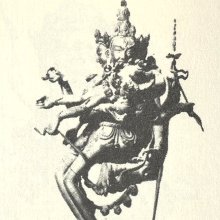Hariti, Harītī: 5 definitions
Introduction:
Hariti means something in Buddhism, Pali, Hinduism, Sanskrit. If you want to know the exact meaning, history, etymology or English translation of this term then check out the descriptions on this page. Add your comment or reference to a book if you want to contribute to this summary article.
Images (photo gallery)
In Buddhism
Tibetan Buddhism (Vajrayana or tantric Buddhism)
Source: Wisdom Library: Tibetan Buddhism1) Hārīti (हारीति) is the name of a deity summoned by the Yamāntaka-mantra and mentioned as attending the teachings in the 6th century Mañjuśrīmūlakalpa: one of the largest Kriyā Tantras devoted to Mañjuśrī (the Bodhisattva of wisdom) representing an encyclopedia of knowledge primarily concerned with ritualistic elements in Buddhism. The teachings in this text originate from Mañjuśrī and were taught to and by Buddha Śākyamuni in the presence of a large audience (including Hārīti).
2) Hārītī (हारीती) is also the name of a Yakṣiṇī mentioned as attending the teachings in the 6th century Mañjuśrīmūlakalpa.

Tibetan Buddhism includes schools such as Nyingma, Kadampa, Kagyu and Gelug. Their primary canon of literature is divided in two broad categories: The Kangyur, which consists of Buddha’s words, and the Tengyur, which includes commentaries from various sources. Esotericism and tantra techniques (vajrayāna) are collected indepently.
Mahayana (major branch of Buddhism)
Source: archive.org: Bulletin of the French School of the Far East (volume 5)Hāritī (हारिती) is the name of a Goddess appointed as one of the Divine protector deities of Śaya, according to chapter 17 of the Candragarbha: the 55th section of the Mahāsaṃnipāta-sūtra, a large compilation of Sūtras (texts) in Mahāyāna Buddhism partly available in Sanskrit, Tibetan and Chinese.—In the Candragarbhasūtra, the Bhagavat invites all classes of Gods and Deities to protect the Law [dharma?] and the faithful in their respective kingdoms of Jambudvīpa [e.g., the Goddess Hāritī in Śaya], resembling the time of the past Buddhas.
Hāritī (हारिती) is also the name of a Goddess appointed as one of the Divine protector deities of Udyāna.

Mahayana (महायान, mahāyāna) is a major branch of Buddhism focusing on the path of a Bodhisattva (spiritual aspirants/ enlightened beings). Extant literature is vast and primarely composed in the Sanskrit language. There are many sūtras of which some of the earliest are the various Prajñāpāramitā sūtras.
Languages of India and abroad
Sanskrit dictionary
Source: Cologne Digital Sanskrit Dictionaries: Edgerton Buddhist Hybrid Sanskrit DictionaryHarītī (हरीती).—[, name of a piśācī: Mahā-Māyūrī 238.19; probably misprint or error for Hārītī.]
--- OR ---
Hāritī (हारिती).—(-putra), see Hārītī.
--- OR ---
Hārītī (हारीती).—name of a deity (referred to as a yakṣiṇī, rākṣasī, or bhūta-mātar): Saddharmapuṇḍarīka 400.7 (Burnouf °ti; a rākṣasī); Mahā-Māyūrī 241.12 (rākṣasī); Suvarṇabhāsottamasūtra 1.8; 85.4 (associated with yakṣas); 3.12 (bhūtamātā); 162.16 (id.); as yakṣiṇī (Ārya-)Mañjuśrīmūlakalpa 608.16; mahāyakṣiṇī (Ārya-)Mañjuśrīmūlakalpa 44.1; Sādhanamālā 103.9 etc.; in Lalitavistara 202.10 yakṣas are called Hārītī-putra (so read, text Hāritī°, best ms. cited as Harītī°).
Source: Cologne Digital Sanskrit Dictionaries: Monier-Williams Sanskrit-English Dictionary1) Hāritī (हारिती):—[from hārita > hari] f. a [patronymic] (-putra m. a son of Harītī), [Lalita-vistara]
2) Hārītī (हारीती):—[from hārīta > hari] f. Name of a deity (-putra m. Name of a family, [Indische Studien by A. Weber])
3) Hārīti (हारीति):—[from hari] m. [plural] [patronymic] [from] hārīta, [Pravara texts]
[Sanskrit to German]
Sanskrit, also spelled संस्कृतम् (saṃskṛtam), is an ancient language of India commonly seen as the grandmother of the Indo-European language family (even English!). Closely allied with Prakrit and Pali, Sanskrit is more exhaustive in both grammar and terms and has the most extensive collection of literature in the world, greatly surpassing its sister-languages Greek and Latin.
See also (Relevant definitions)
Starts with: Hariti-putra, Haritikar, Haritikrita, Haritima, Haritin.
Ends with: Dharitri, Vaidarbhariti, Yathariti.
Full-text: Hariti-putra, Priyamkara, Saya, Udyana, Skanda, Putana, Kshetra.
Relevant text
Search found 15 books and stories containing Hariti, Harītī, Hāritī, Hārītī, Hārīti; (plurals include: Haritis, Harītīs, Hāritīs, Hārītīs, Hārītis). You can also click to the full overview containing English textual excerpts. Below are direct links for the most relevant articles:
The Practice Manual of Noble Tārā Kurukullā (by Dharmachakra Translation Committee)
The gods of northern Buddhism (by Alice Getty)
Puranic encyclopaedia (by Vettam Mani)
Sripura (Archaeological Survey) (by Bikash Chandra Pradhan)
Padmapani Vihara (SRP-10) < [Chapter 2 - The Architectural Panorama]
History of Indian Medicine (and Ayurveda) (by Shree Gulabkunverba Ayurvedic Society)
Chapter 1 - The history of Medicine in India (Introduction) < [Part 1 - The History of Medicine in India]
The Golden Age of Hindu-Javanese Art < [September-October 1932]
Reviews < [July-August 1933]
Buddhism in Andhra – Its Arrival, Spread and < [July – September, 1994]
Related products


